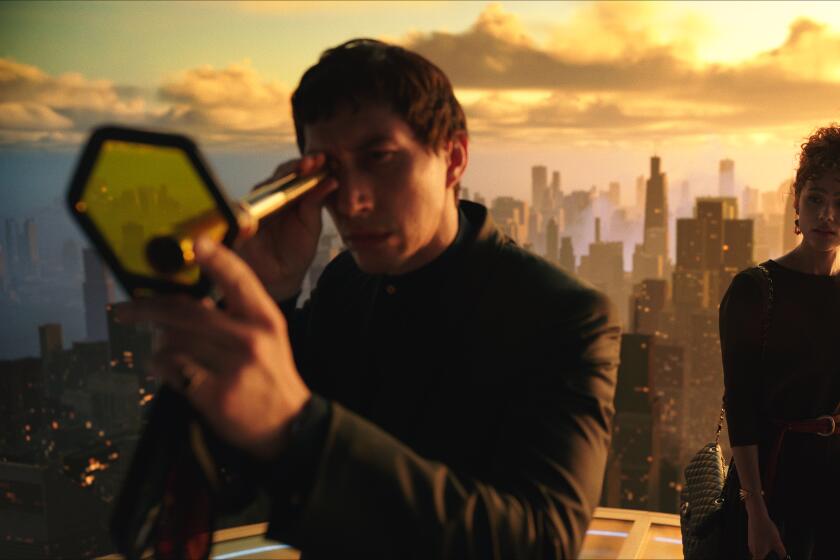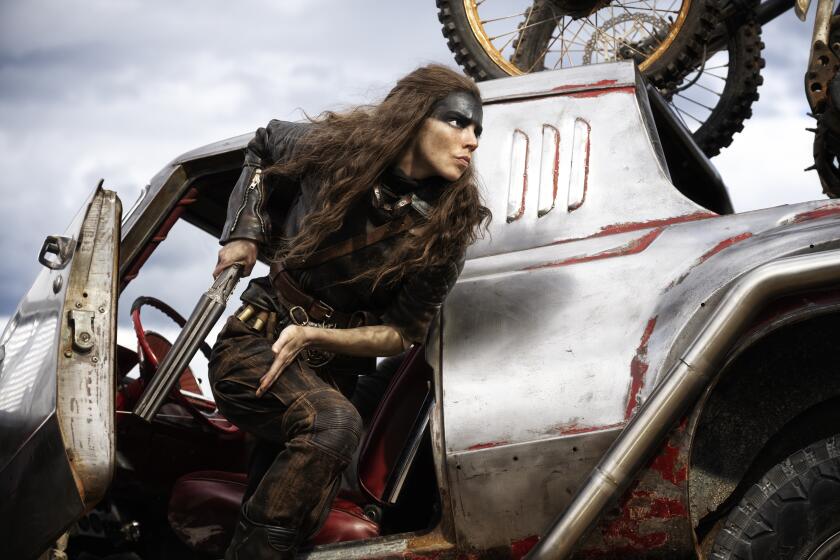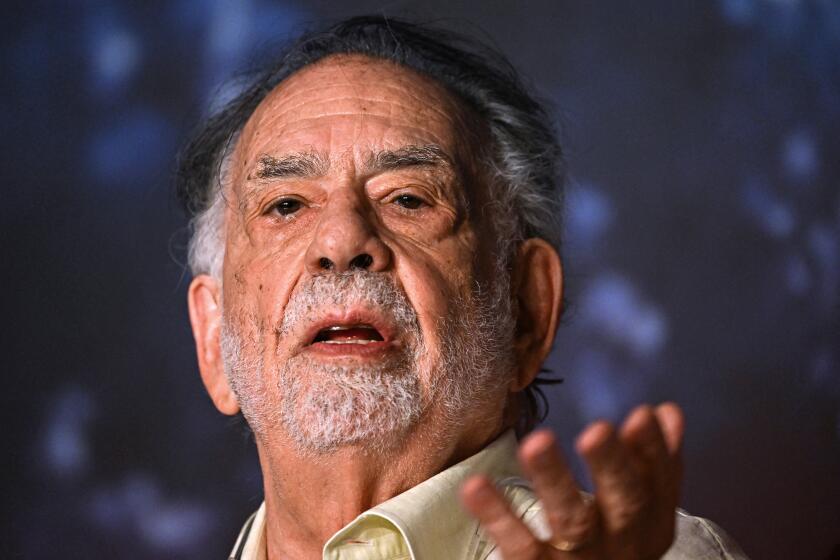Kevin Costner’s ‘Horizon: An American Saga’ should have been a TV show
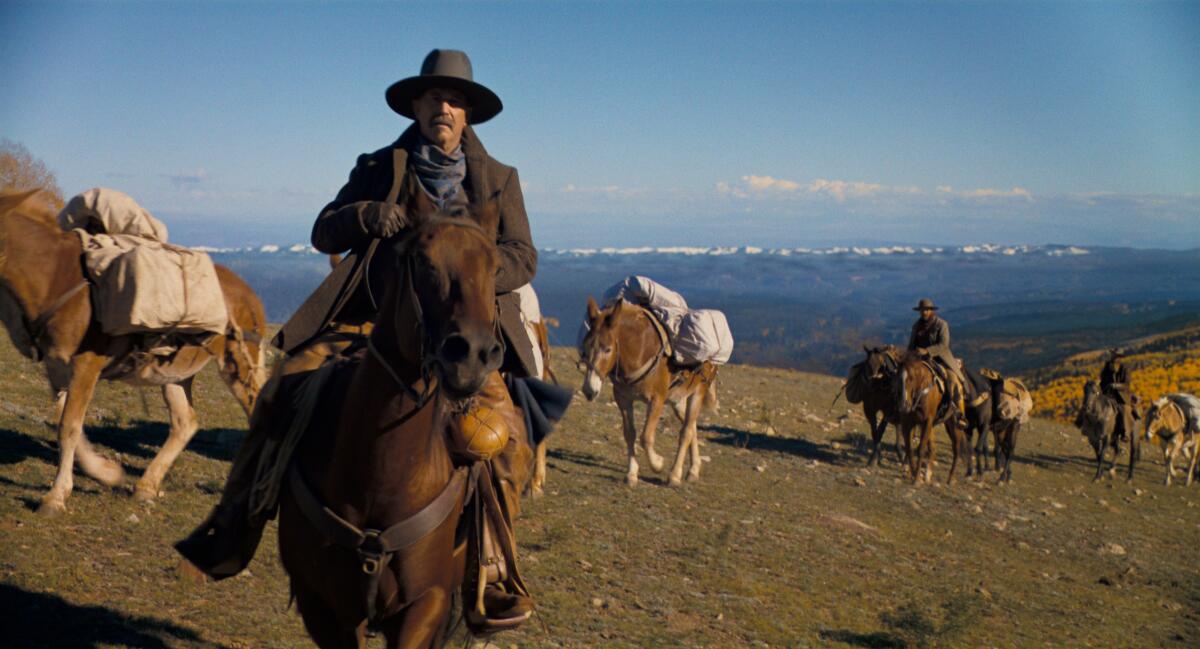
- Share via
CANNES, France — To anyone worried that “Megalopolis” would be the only risky, expensive late-career epic from a Hollywood legend to premiere at this year’s Cannes Film Festival, breathe easy. With “Horizon: An American Saga — Chapter 1” (three more parts are planned), Kevin Costner has you covered.
The “Dances With Wolves” Oscar winner, accompanying his fourth feature behind the camera, arrived at the movie’s Cannes festival premiere Sunday as cool as a cucumber, sporting shades, a wry smile and a neat mustache, but by the time he accepted the gala audience’s extended standing ovation, Costner was visibly moved.
“I’m sorry you had to clap that long for me to understand that I should speak,” he said during brief remarks inside the Grand Lumière Theatre after the applause relented. “I think movies aren’t about their opening weekends. They’re about their life. About how many times you’re willing to share it. And I hope that you do share this movie with your sweethearts, with your children. I feel so lucky. I feel so blessed. And there’s three more.”
After catching up with “Horizon’s” first chapter, which arrives in U.S cinemas June 28, deputy entertainment & arts editor Matt Brennan and movies editor Joshua Rothkopf tried to get their arms around it. Read their conversation below.
Starring Adam Driver, Giancarlo Esposito and an unhinged Aubrey Plaza, the storied director’s latest passion project brings the heat of an event film to Cannes.
Matt Brennan: Josh, if the old adage about “one for you, one for them” still holds true, then “Horizon,” the four-part western that succeeded (and eventually came into conflict with) Costner’s blockbuster TV series “Yellowstone,” is one he’s been accruing the fiscal and reputational capital to make for a Hollywood lifetime. And boy, does he spend it.
Clocking in at three hours for Chapter 1 alone, with plots that originate in the Arizona desert, the Rocky Mountains and the plains of western Kansas, populated by an army regiment’s worth of characters, “Horizon” is, logistically if not formally, every inch the equal of Francis Ford Coppola’s “Megalopolis” in wild (deranged?) ambition. Unlike so many schlock films, TV series and beach reads of recent vintage to employ the “American” adjective as a marketing ploy, “An American Saga” here signals the true scope of Costner’s vision, encompassing Native Americans, the pioneers who supplant them, the Union soldiers who protect them, the outlaws who prey on them, and the Black, Mexican and Chinese laborers without whose work the American saga would have long since stopped short.
All are converging on the town of Horizon, more idea than place, promoted in fliers and parceled out by Eastern economic interests but ultimately scarcely settled; the handful who’ve tried have had their homes razed by the Indigenous Apaches whose lives and livelihoods they’ve disrupted. For now, though, we are scattered to the four winds, following a mother and daughter who are among the sole survivors of the latest raid and who are taken to recuperate in a federal fort nearby; gunslinger Hayes Ellison (Costner), who becomes embroiled in a multiterritory revenge plot; and Matthew Van Weyden (Luke Wilson), the reluctant leader of a westbound wagon train. Countless other threads are introduced — some swiftly (and often bloodily) brought to an end, others barely a ripple for now — to the point that Chapter 1 concludes with what can only be described as a trailer for the rest of the saga. This isn’t just Costner’s “Megalopolis.” This is his “Lord of the Rings.”
And unaccountably, I liked it. More precisely, I found myself reverting to the capacity for trust I cultivated in my days covering television. I’m engaged enough in the arc of many of the characters, particularly Miller’s Frances Kitteridge — in a budding romance with Union Lt. Trent Gephardt (Sam Worthington) — to see where the project goes from here. And I’m intrigued by the decision to use this solitary, hardscrabble outpost, or the journey to it, as a lens through which to view the full complement of social and political issues facing 19th century (and present day) America.
As to whether distributor Warner Bros. genuinely expects the general public to see and recommend this with so little self-contained payoff, that’s another question. But luckily, it’s one I’m not compensated enough to spend any time answering.
So what say you? Is “Horizon” the capstone achievement of Costner’s career or his cowboy Xanadu?
In expanding the story of Furiosa (Anya Taylor-Joy), director George Miller still creates entertaining, pounding action — but loses the forward momentum on which the franchise is based.
Joshua Rothkopf: Come back, Michael Cimino — all is forgiven. I mention the late director of 1980’s “Heaven’s Gate” because there already is a cowboy Xanadu, one still struggling to graduate beyond its status as a famous Hollywood bomb and film maudit. But we didn’t know how good we had it: At least “Heaven’s Gate” was shot by the brilliant Vilmos Zsigmond and attempted some big ideas and a shape.
“Horizon” is television. I mean that literally, although I obviously can’t prove it. It has dramatic thumps every 50 minutes or so — a raid, a shootout, an orchestral swelling. “Chapter 1” feels like a cobbling together of the first three episodes (along with a brief sizzle reel of upcoming moments at the end) and given a fancy Cannes premiere. It makes sense, Matt, that your “capacity for trust,” developed from covering TV, is letting you connect with it on a deeper level than I can. To me, it’s a pretender in a festival filled with the opposite.
If “Horizon” is TV, what kind of TV is it? I can’t help but be reminded of James Poniewozik’s recent essay for the New York Times about what he called Mid TV, or “prestige TV that you can fold laundry to.” It’s, you know, just fine. “Horizon” is absurdly over-plotted and peopled with redundant characters, lending it an epic “scope” that aspires to an E.L. Doctorow novel but isn’t justified, at least for now. (Charitably, it’s one of those shows your friends would recommend to you with the caveat that it takes a few episodes to “get going.”) You pick your favorite character from the decent, unexceptional cast — for me, it was Danny Huston’s exposition-heavy colonel, who says things like, “That’s how they’ll reason in the face of fear” — and wait for them to cycle around.
It passed the time. It probably helped that I love westerns. More troublesome are some of “Horizon’s” banal formal choices. Do you not have a problem with the professionally lighted flatness of the look and color palette? Those dumb dissolves between scenes? The methodical editing that chops everything into a pabulum-like TV hash? I never thought Costner had a visual style to begin with, but at least on “Dances With Wolves,” he had cinematographer Dean Semler, who also did “The Road Warrior” and “Dead Calm.”
Did you feel like you were watching a film? I wanted to check my email.
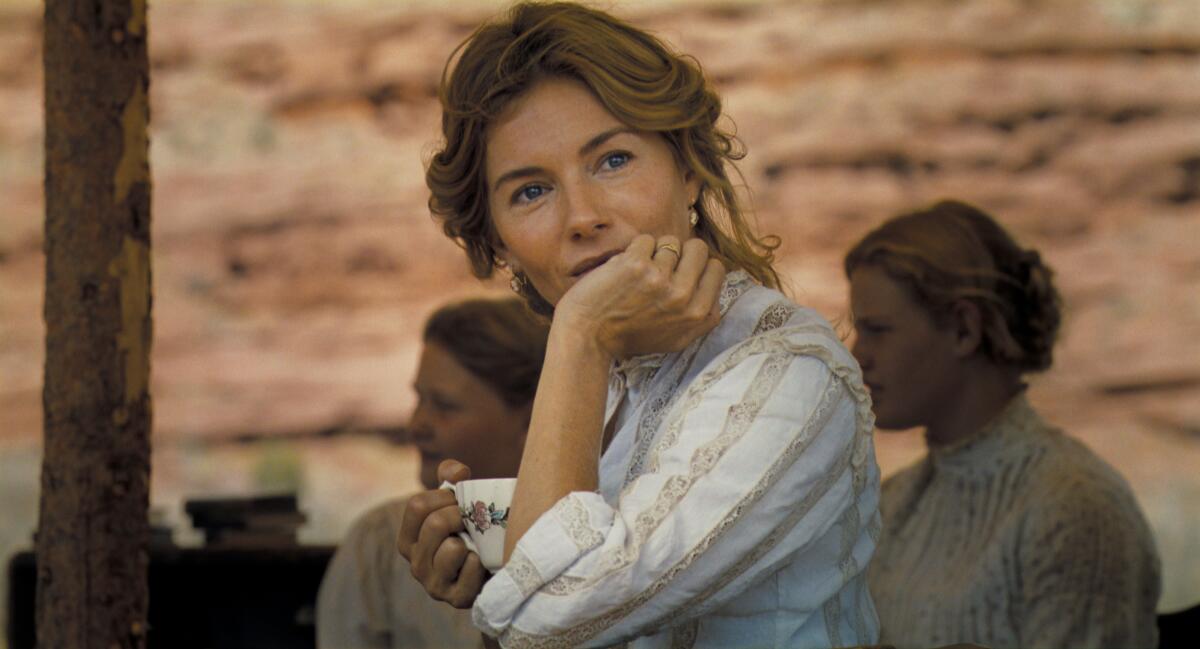
Brennan: Categorizing “Horizon” as television would explain its aesthetic, which reminded me of a trend that dates back to at least “Game of Thrones”: setting otherwise anodyne shot-reverse-shot filmmaking on dramatic clifftops and ravishing vistas to distract from the lack of visual style.
But, as in TV — a writer’s medium, after all — I found myself drawn into an internal argument over the narrative and ideological possibilities of “Horizon’s” structure that kept me engaged even when it all started to look like my laptop’s home screen. Unlike the more focused, hard-edged period westerns that have dominated the genre in recent decades, such as James Mangold’s “3:10 to Yuma” or Quentin Tarantino’s “The Hateful Eight,” this one has melodrama, romance, action, even hiccups of comedy all swirled together. I appreciated that traditionalism, which suggested to me the old “cavalcade of stars” approach to grandiose moviemaking, even if the project’s star power and serialized nature suggest prestige (or “mid”) TV.
For me, the far thornier problem, and one difficult to evaluate in a multipart narrative, is “Horizon’s” handling of its Native American characters. In a film set in the 1850s and otherwise devoutly committed to classical Hollywood trappings, the presence of Indigenous characters and tongues from the opening frames of “Chapter 1” — as Apache children peer down on father-son settlers from a rocky point, believing (wrongly) that it’s just a “game” — is a promising indication that Costner intends to depict the pioneers as outlaws in their own right, stealing Native land through legal means.
By the end of the film, though, I was beginning to worry, and not only because what Native characters have been established lack definition like the Kitteridges or Costner’s Hayes Ellison. Whereas “Horizon” develops Native characters primarily vis-a-vis the political crisis they face, the “white-eyes” Anglos have love (and sex) lives, religious organizations, business concerns.
It reminded me of a line from the film in which an Irishman in the Union forces says, “We don’t make our history any more than they make their weather.” In other words, in “Horizon’s” view, Anglos have families, while Natives have war; Anglos have history, Natives weather. I can only hope that the depiction of the Apache characters deepens in “Chapter 2,” due in August.
So I’ve now tempered my praise. Did you find any redeeming qualities in it?
The filmmaker addressed the press at the 2024 Cannes Film Festival after the premiere of his deeply personal, occasionally baffling epic ‘Megalopolis’ polarized critics.
Rothkopf: A tall ask, my friend. Let’s talk about that writer’s medium for a second. As you say, “Horizon” reaches for many tones, but would any writers’ room on a show have spent its first three hours compiling them in such a lifeless then-this-happened manner? We’re talking about the development of at least 20 major speaking roles via impressionistic dribs and drabs, none of these plot strands interconnecting (at least thus far).
It’s a lot of movie — I just wish it were a lot of feeling. We never get to know the Kitteridges before a raid on their homestead wipes out most of them. Wouldn’t doing so have helped? It seems perverse to be asking a three-hour piece of entertainment for more connective tissue, but that’s where I am with this.
I share your concern about the project’s depiction of Native American characters, and the solution should be giving them more of a share of screen time — not, as we hear a few times, by having white characters use the term “Indigenous,” anachronistic to 19th century conversation. It would be better to depict racism honestly, not soften it.
Positives? I liked it when Luke Wilson showed up as the head of a wagon train leading a group of pioneers through Kansas Territory — a party that includes a pair of dotty Brits who assume their fellow travelers are their servants. The “Idiocracy” actor is expert at a frustrated slow-burn; had the whole thing been chopped down to a comedy, I probably would have enjoyed it more (speaking as someone who thinks Costner’s best western is 1985’s “Silverado”).
And I do know there was at least one person at Cannes who loved “Horizon,” though perhaps for different reasons: Francis Ford Coppola.
More to Read
Only good movies
Get the Indie Focus newsletter, Mark Olsen's weekly guide to the world of cinema.
You may occasionally receive promotional content from the Los Angeles Times.
